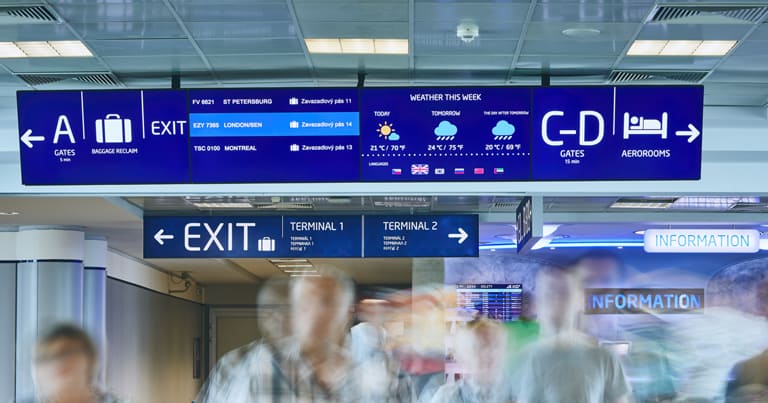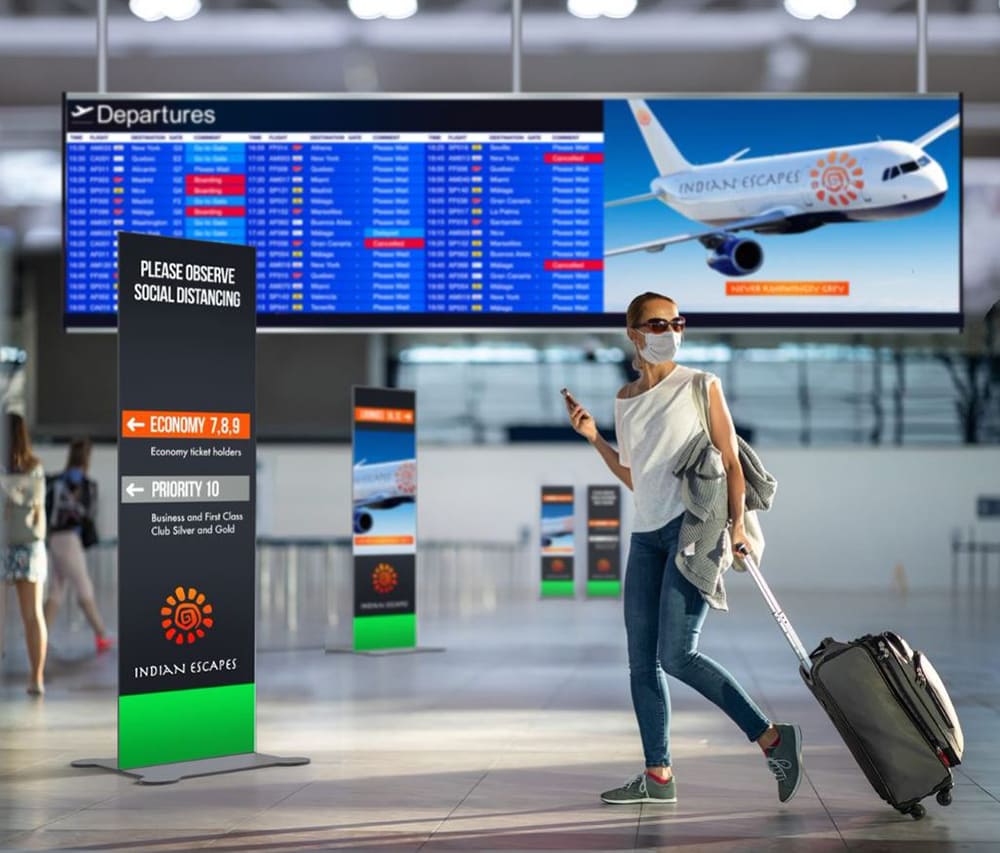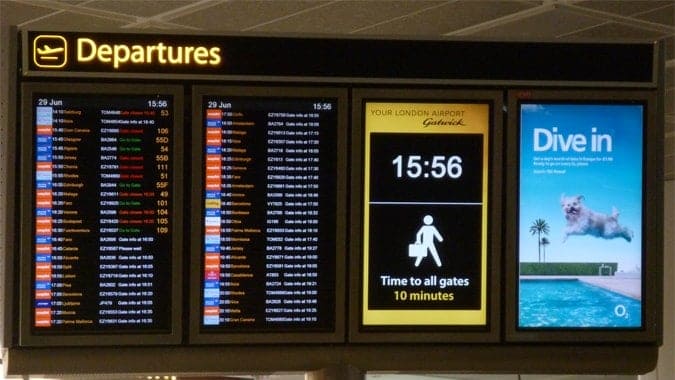Airports are bustling hubs of activity where effective communication is crucial for ensuring smooth operations and a positive passenger experience. In such a fast-paced environment, traditional static signs often fall short of providing the dynamic, real-time information travelers need. This is where digital signage comes in. Airport digital signage offers a versatile, efficient, and engaging solution to support communication needs, enhancing both functionality and aesthetics. This article explores various aspects of airport digital signage, including different styles, best uses, and how Signs&Logo can help improve your airport with state-of-the-art digital signage solutions.
Style of Airport Digital Signage
Digital signage comes in various styles, each suited to different purposes and locations within an airport. Understanding these styles can help in selecting the most appropriate options for your specific needs.
Video Walls
Video walls are large displays composed of multiple screens seamlessly combined to create a single, expansive visual surface. These are perfect for high-traffic areas where large audiences need to view the information simultaneously.
- Impressive Visuals: Video walls offer high-resolution displays that can showcase detailed content clearly, even from a distance.
- Versatile Content: They can display anything from flight information and advertisements to emergency alerts and promotional videos.
- Engagement: Their sheer size and visual impact naturally draw attention, making them effective for important messages.
Digital Kiosks
Digital kiosks are standalone interactive displays that allow passengers to access information and services at their convenience.
- User Interaction: Kiosks can provide interactive maps, ticketing services, and information about airport amenities.
- Self-Service: They enable passengers to perform tasks independently, reducing the need for staff assistance.
- Customization: Content can be tailored to meet specific needs, such as language preferences or personalized travel information.
LED Displays
LED displays are versatile and can be used in various locations, from gate areas to baggage claim zones. They are known for their brightness and visibility.
- Durability: LED displays are robust and can withstand the rigors of high-traffic environments.
- Clarity: They offer excellent visibility, even in brightly lit areas.
- Flexibility: Content can be easily updated to reflect real-time information.
Wayfinding Displays
Wayfinding displays help passengers navigate the airport efficiently, providing directions and information about amenities.
- Navigation: Clear and concise directions help reduce confusion and improve passenger flow.
- Information: These displays can also provide details about nearby services, such as restrooms, dining options, and retail stores.
- Accessibility: Wayfinding displays can be designed to accommodate travelers with disabilities.
 Best Uses of Airport Digital Signage
Best Uses of Airport Digital Signage
Digital signage can be utilized in numerous ways within an airport to enhance communication and improve the passenger experience.
Constant Flight Updates
Keeping passengers informed about flight schedules is one of the most critical functions of airport digital signage.
- Real-Time Information: Digital displays provide up-to-the-minute flight information, including departures, arrivals, delays, and gate changes.
- Passenger Confidence: Knowing they have access to accurate information helps reduce anxiety and improve the overall travel experience.
- Operational Efficiency: Digital signs can help manage passenger flow by directing them to the correct gates and reducing congestion.
Streamlined Airport Navigation
Effective navigation is essential for ensuring passengers reach their destinations quickly and efficiently.
- Interactive Maps: Digital kiosks with interactive maps allow passengers to find their way around the airport with ease.
- Directional Signage: Clear directional signs help guide passengers to gates, baggage claim, exits, and other important areas.
- Multilingual Support: Digital signs can display information in multiple languages, catering to an international audience.
Engaging Traveler Signage
Engaging content can enhance the passenger experience and provide valuable information.
- Advertisements: Digital signs can display targeted advertisements, promoting airport amenities, local attractions, and retail offers.
- Entertainment: Displaying engaging content such as news, weather updates, or short videos can keep passengers entertained while they wait.
- Event Promotion: Highlighting upcoming events or special promotions can capture passengers’ interest and drive engagement.
Improve Your Airport with Digital Signage from Signs&Logo
Segni&Logo is a leading provider of high-quality digital signage solutions tailored to meet the unique needs of airports. Here’s how Signs&Logo can help transform your airport’s communication infrastructure.
Custom Design Services
Segni&Logo offers custom design services to create digital signage that aligns with your airport’s branding and functional requirements.
- Tailored Solutions: Custom designs that reflect the airport’s brand and enhance its aesthetic appeal.
- Professional Consultation: Expert advice to determine the most effective digital signage solutions for your airport.
- Innovative Designs: Creative and innovative design approaches that ensure your signage stands out.
High-Quality Products
Segni&Logo uses only the highest quality materials and technology to ensure your digital signage is durable, reliable, and effective.
- Durability: Products designed to withstand the demanding airport environment.
- Clarity: High-resolution displays that provide clear and visible information.
- Eco-Friendly Options: Sustainable materials and energy-efficient technology that reduce environmental impact.
The Role of Technology in Modern Airport Signage
Incorporating advanced technology into airport signage can significantly enhance its functionality and user experience.
Real-Time Data Integration
Integrating real-time data into digital signage ensures passengers have access to the most current information.
- Flight Information: Real-time updates on flight schedules, delays, and gate changes.
- Weather Updates: Current weather conditions and forecasts to help passengers plan their travels.
- Traffic Alerts: Information about traffic conditions around the airport.
Interactive Features
Interactive features can engage passengers and provide them with valuable information and services.
- Touchscreens: Interactive touchscreens that allow passengers to access maps, services, and other information.
- Mobile Integration: Integration with mobile apps to provide a seamless travel experience.
- Social Media: Displays that show social media updates and interactions.
Conclusione
Airport digital signage is a powerful tool that supports effective communication, enhances passenger experience, and improves operational efficiency. By understanding the different styles of digital signage, recognizing their best uses, and partnering with a trusted provider like Signs&Logo, airports can create a dynamic and engaging environment for travelers. Whether it’s providing constant flight updates, streamlining navigation, or engaging passengers with interactive content, digital signage is an essential component of modern airport operations. Investing in high-quality digital signage solutions from Signs&Logo ensures your airport remains at the forefront of innovation, delivering a superior experience for all who pass through its doors.






Lascia un commento